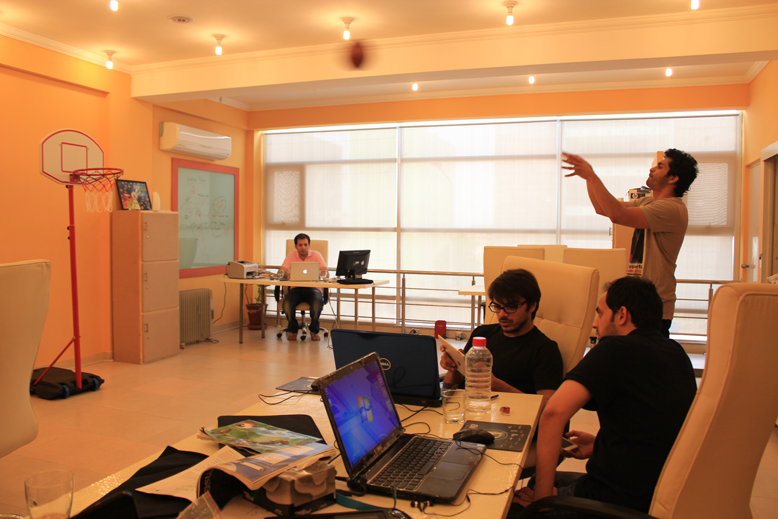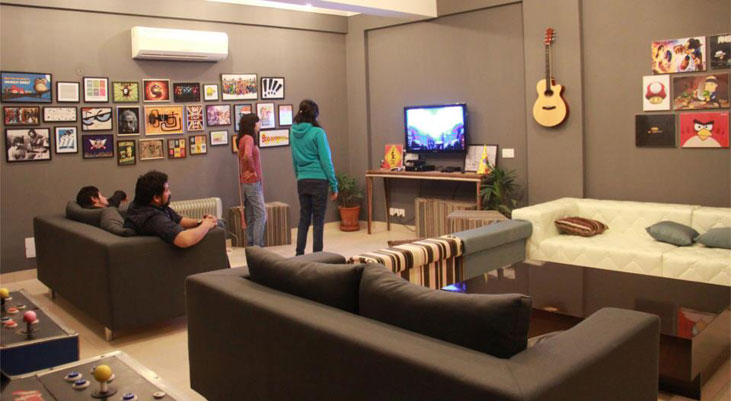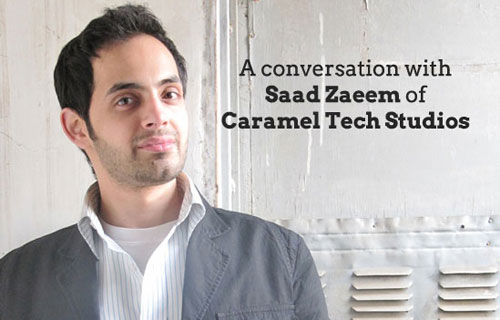Saad Zaeem is the young CEO & Co-Founder of one of the top Pakistani game development company, Caramel Tech Studios. Caramel & Technology? Sound good right? What’s not to like about that! The company has worked on international high quality mid-core strategy and arcade games for tablet and mobile devices like; Fruit Ninja, Jetpack Joyride, Blades of Battle RPG along with many others.
TechJuice recently got a chance to chat up with Saad in a rather fun setting. We were in a wonderfully decorated room equipped with games like pool, basketball hoop, foosball and video games with a large TV screen with X-Box. No, we didn’t meet up at a game arcade or an amusement park, this was actually the games room at Caramel Tech Studios HQ. The company has casual and super-fun workplace environment and truly living up to their company motto, “…we take fun, seriously!”
Without further ado we present the interesting and insightful interview with Saad:
TechJuice: Tell us about your entrepreneurial journey.
Saad Zaeem: Growing up in a business household, I was interested in entrepreneurship since I was young. At 14, I started up a web development company with my brother Ammar, who was 12 at the time. That was our first real entrepreneurial venture. We had a contractual partnership with local retail chain who wanted an e-bidding website. We successfully did that project for them and that also helped in branding of the supermarket chain.
Our father started teaching us from early on. While others played outside, we sat inside getting business coaching. And it’s amazing how all that and his continued support today, has helped us overcome so many challenges.
Guidance and mentorship are absolutely essential.
TJ: That’s impressive but how did a couple of teenagers land such project?
SZ: In Pakistan, back in the 90’s, you had to be young or really experienced to get a gig of that sort. I guess, people associated tech with kids at that time. I remember that we had a meeting with our first customer and we successfully convinced them to give us the job by demoing some websites we had made in day.
Later, when my O-levels started, my parents told us to focus on the studies and take a break from the other things we were doing. We still did a bunch of other random entrepreneurial ventures and explored some options after that. For instance, we came up with a water supply idea, when there was extreme water shortage in Islamabad and people had to wait in long queues to get their water from the water tankers.
I was around 16 or 17 at that time. Although we did a lot of market research for that idea, we never went forward with it. Since dealing with concerned people and looking after the orders wouldn’t have been easy to manage along with studies.
TJ. Were you good with studies?
SZ: I was pretty alright, had A’s in my A-levels, got into LUMS, however my focus was always on entrepreneurial endeavors and that is what fascinated me. When I got into college, I knew I needed to diversify. I picked up courses that were interesting to me and not necessarily those which would help me in a conventional career. Luckily, LUMS offered a flexible schedule that suited me just right.
TJ: After graduating, did you jump right into entrepreneurship or did you have any job before that?
SZ: After my graduation, I briefly joined a jeans export company and rose up the ranks pretty quickly. My job entailed communicating and interacting with international brands and managing their jeans production.
The job was very demanding. It consisted of 4 hours of daily travel time plus 10-12 hours of work every day. It was tough but taught me a lot. The two most important things I learned from that job were “hard work” and the concept of “how things are managed at a larger scale”.
TJ: How did you enter the world of gaming?
SZ: Games was something most children around me grew up with. After leaving my first job, I joined a game development start-up and worked there for about 2.5 years. It was a great experience.
The experience in the games industry made me feel I could much more and different than what I saw in the local and international space. I had ideas and wanted to bring them to reality.
I shared the idea with my brother who was investing in stocks and looking after large scale marketing projects at that time. Tech was something that fascinated us from early on. So we said, let’s do this and founded Caramel Tech Studios. I was confident that what we were building was eventually going be something really good and big.

TJ: How difficult was the decision to start your company?
SZ:
Naturally, when you start a new business you take on various risks. I left my job and decided to pursue my dream and decided to take on the risk with my brother. Fortunately for us, things sky-rocketed. We weren’t expecting such a growth at an early stage.
While it was nice for us, early growth isn’t always a good thing. You can miss a lot of important lessons if you move too fast. It can be a great thing if you know how to manage things.
Since my father was also a businessman, we were coached and taught business and to recover from mistakes quickly. One of the keys to entrepreneurship is, learn how to quickly manage your mistakes and learn from them.
TJ: What qualities does an entrepreneur generally need in their Co-Founders?
SZ: I think that it is important for the Co-Founders to be on the same wavelength. Age is another factor, having co-founders that are in the same age group can help in many ways. Plus, it is essential to have more people in technology startups. Co-Founders bring different skills to the team.
A single individual is highly prone to taking some very wrong decisions, however with an able Co-Founder, better and quicker decisions can be taken.
A Co-Founder also helps in sharing the stress in times of need. Managing stress is key for any budding or seasoned entrepreneurs alike.
TJ: Has having your brother as a Co-Founder to this company affected your relationship and what does your family say about this?
SZ: Oh, it’s been great! We are very good friends. Previously, when we were involved in different ventures, we didn’t get to spend as much time with each other. Now, we see each other all the time.
Initially, my family felt that we were spending too much time at work but then they became more comfortable with our schedule. Since I come from a business household, fortunately they adjusted relatively quicker.
TJ: Have you faced any setbacks with your current venture?
Caramel Tech Studios hasn’t faced any major setback so far, Alhamdulillah. Entrepreneurship is definitely a bumpy road though.
*Saad’s gamer side comes out and he points out an analogy between games and entrepreneurship to explain this further*
It’s like an endless runner game or a platformer, where you constantly face various hurdles and obstacles at each stage, but you have to keep moving forward without giving up. The further you go, the higher you can score.
TJ: What does it take for an entrepreneur to know that a certain idea isn’t going to work? What’s the perfect time to wrap-up a startup idea?
SZ: There is no ideal time. It’s very different for different people and businesses.
*Saad continues on by giving an example of a successful Pakistani entrepreneur (FireEye‘s Ashar Aziz) whose idea took many years to finally come to life and then take off. During the process half of his company left and his venture capitalist had written the company off as a failed venture. None of that shook his belief and he stayed focused on his vision and gut and just kept going on till the end. The company went public on NASDAQ earlier in 2014 (NASDAQ: FEYE), and was one of the most successful tech IPOs for 2014. *
Gut feeling and personal beliefs are important. On the other hand there are some examples of people who failed early and started another venture which was a home-run. Sometimes it all comes down to the entrepreneur. In many scenarios it is also the question of how much the entrepreneur can afford to risk and lose, and how much burden can their family take.
TJ: Is it essential for a successful entrepreneur to be a harsh (or even rude) boss?
SZ: I’m personally not harsh at the workplace and we seem to be doing alright. As for the other companies, (Saad ponders for a moment to find the perfect words) the CEO has to be, not necessarily rude, but at times blunt and always decisive. People can be nice and down-to-earth yet successful. Take Google Co-Founder, Sergey Brin for example, he can be seen around the Google campus on a segway and is easy to approach.
TJ: There’s is a general belief among the people that one has to be financially stable to be a successful entrepreneur. Is it true that only the rich get richer and the situation is not as favorable for a common man?
SZ: In any country around the world and in any new business we see that in the initial crop. The reason behind that is that the financially stable people are able to take more risks. Hence we see more representation from this segment.
Nevertheless, it doesn’t mean that you have to be wealthy to start something great. I think that as more incubators come up in Pakistan, more people from varied backgrounds are going to emerge with great startups. Moreover, these people have higher probability of success at a startup because they have a high hunger for success, and they give it their all, since they don’t generally have a family insurance as backup, so for them it’s do or die.
TJ: As an investor, what are you looking for in startups?
SZ: Investors are generally looking for something that’s new and groundbreaking. For me, I’m interested in a company that’s healthy or has the potential of becoming a financially healthy entity. Secondly, the startup team, and their capability, passion, foresight and ability to deliver results.
TJ: What are your favorite games to play?
SZ: Well, games usually have a limited life-time. We tend to get over a game sooner or later but one of my all time favorites is “Monkey Island 2: LeChuck’s Revenge”.
Actually, I recently visited a company and it turns out Monkey’s Island Game Designer was its Founder. Unfortunately, he wasn’t in the premises at the time. Him and his team are still making some amazing games.
TJ: What are your favorite gadgets?
SZ: I’d have to say Apple’s Time Capsule. It’s an amazing device. We have a few of them at our office. It just takes few clicks and sets itself up. The Time Capsule offers one of the fastest WiFi file transfer rates. I’m a fan of this hassle-free network set up and backup device, and I try and upgrade whenever a new one is available.
TJ: iPhone or Android?
SZ: I like them both since we make games for both the platforms. Personally, I’m an iPhone user though because I find Android a little too cluttered for my taste.
TJ: What other startup do you admire and what would you ask their CEO?
SZ: I think Facebook has an amazing startup to IPO journey. I would ask Mark Zuckerberg how he managed everything so amazingly well given he was a first-time CEO, when the company grew at this immense rate and scale. It is brilliant how things were managed without any major stumbles which could’ve hampered their growth.
TJ: What was the last pep talk you gave yourself?
SZ: I can’t recall any pep talks however I have this unrelenting belief that we’re going to build an amazing company which makes great games, something that delights the demographic we target. I strongly feel we are on our way now, we are learning each day and are improving as a team.

TJ: What’s the best piece of advice someone’s given you? And what is your advice for young Pakistani entrepreneurs that want to launch their own startups?
SZ: Someone once told me that it’s all about getting punched in the gut, falling down and rising back up again. And then keep on rising again and again and again. Not giving up is the key, success comes when you keep going on. It’s most important to believe in yourself and give it your 100%.
A small but important advice to local young entrepreneurs is that they should try and get an office space around October/November months.
In Pakistan, it’s quite important because the company and the products need your laser focus especially early on. One cannot be distracted by random but inevitable operational issues like load-shedding, AC or generator breaking down, etc.





 Chinese Investors to Set up Smartphone Plants in Pakistan
Chinese Investors to Set up Smartphone Plants in Pakistan